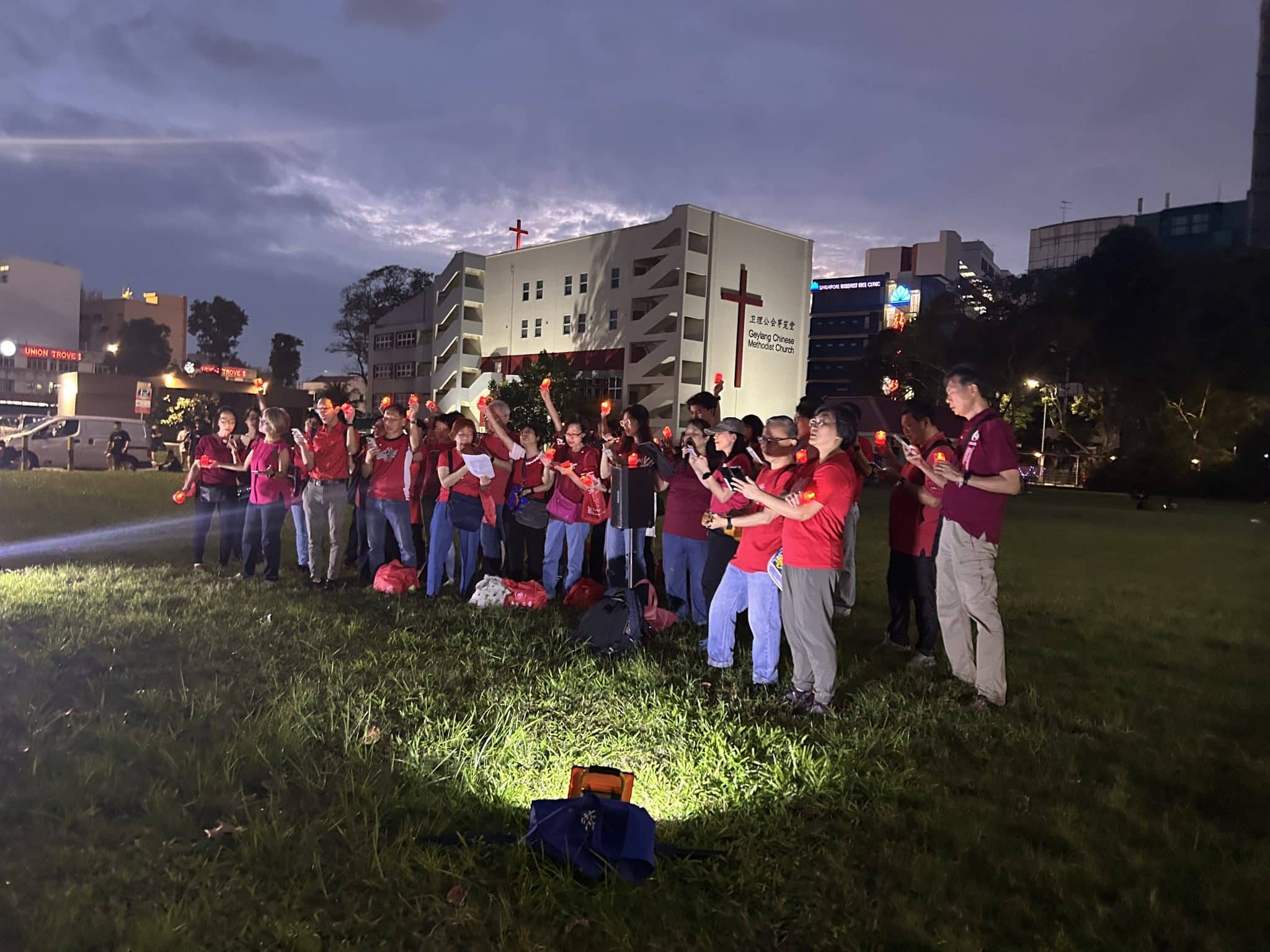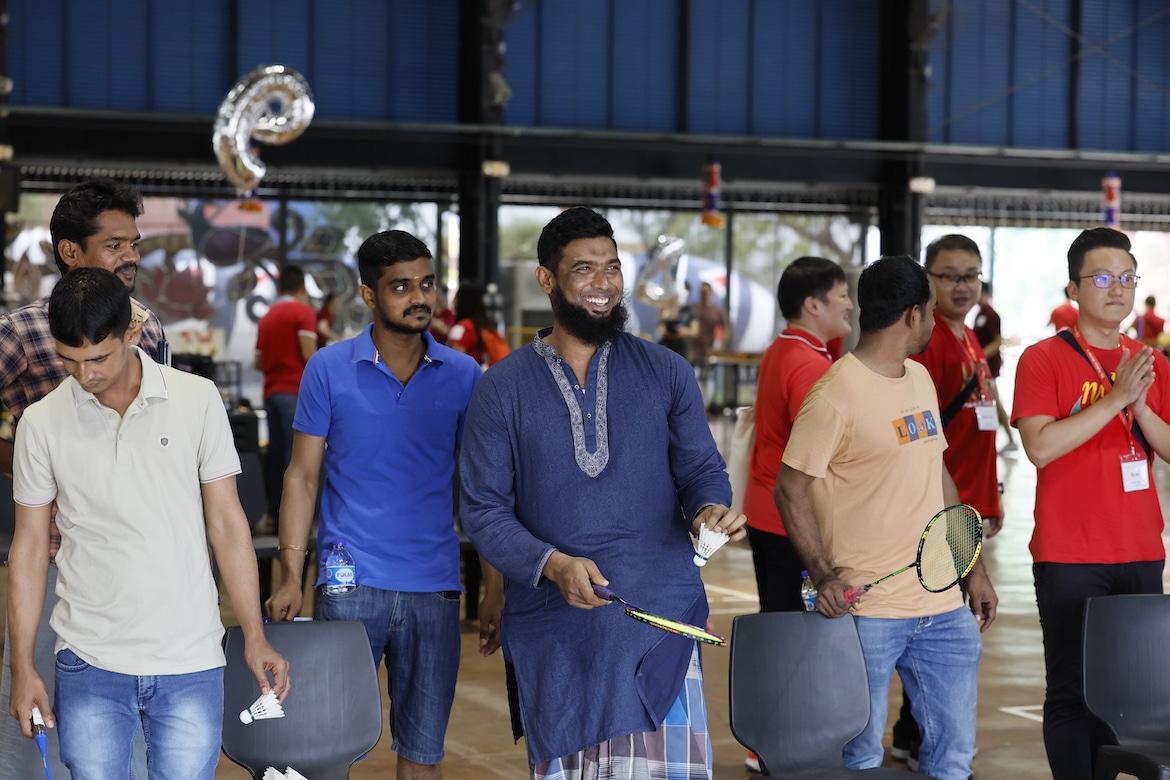“At this time, what they need is family,” say volunteers who deliver thousands of 2am Ramadan meals to migrant workers
Gracia Lee & Tan Huey Ying // May 1, 2020, 7:59 pm
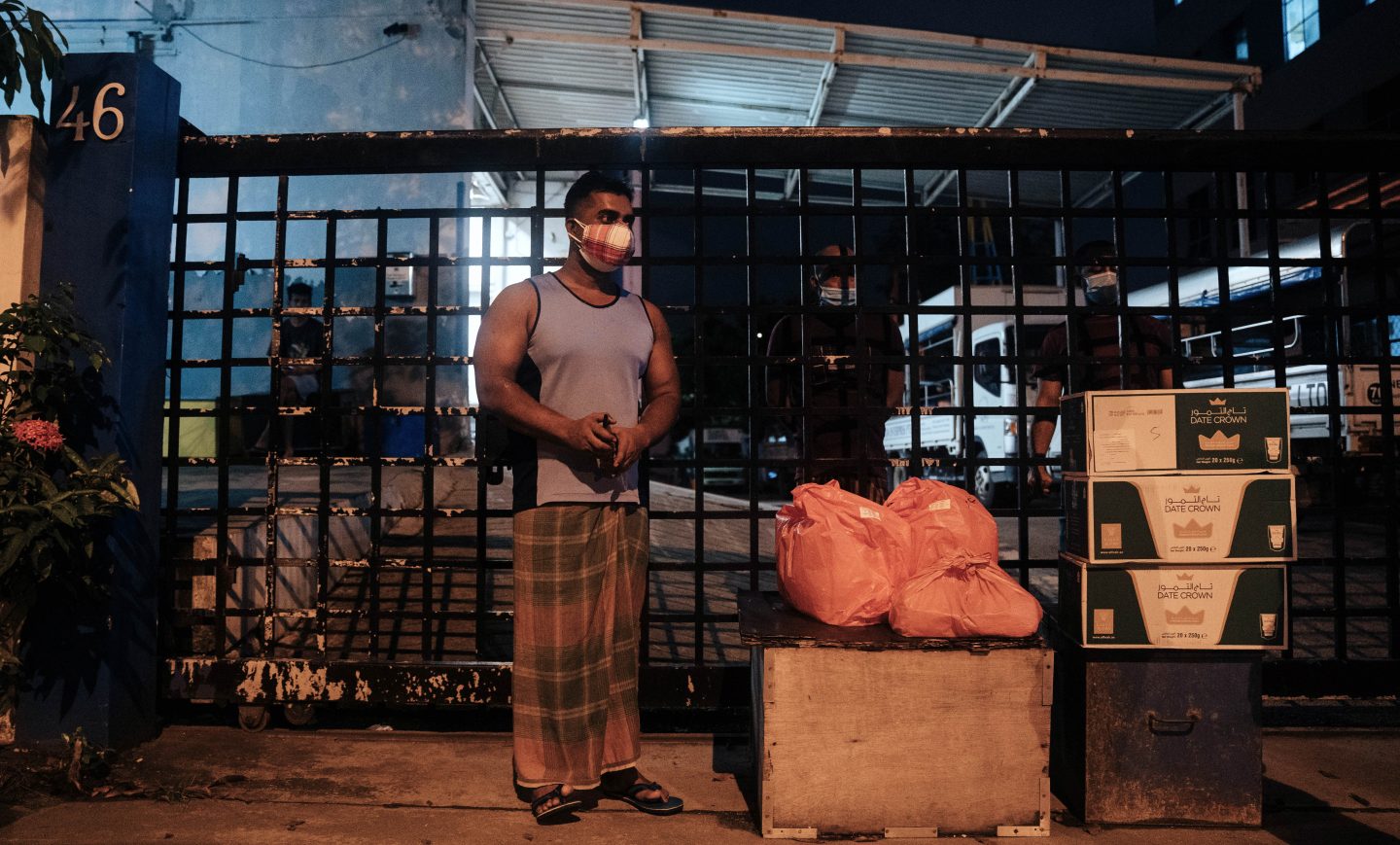
"Before we were scared. Now we are not scared because the government has taken many steps. Many of you are also helping," said a migrant worker to the volunteers delivering Ramadan meals in the pre-dawn hours. Photo by Marcus Chow.
It is 2am.
At a nondescript industrial building in Admiralty, Shirley Yip and Samuel Teo pull their car up next to a night kitchen on the fourth level, joining a queue of others who have already arrived.
Once out of the car, the couple load up the car boot with red plastic bags, each containing 20 packets of rice with fish curry. Their next stop: Tuas.
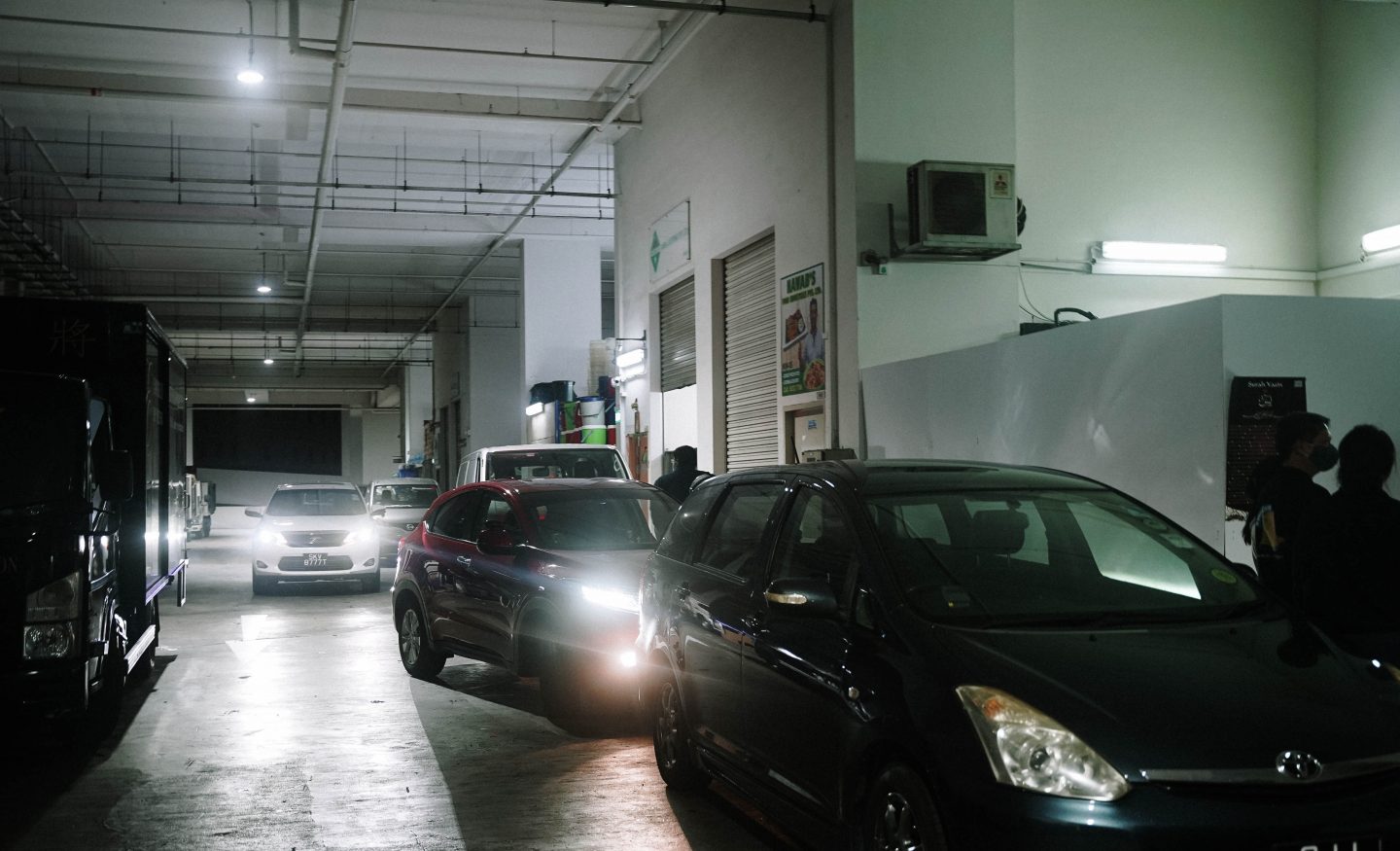
A queue of cars form outside this night kitchen in Woodlands at 2am every night. Volunteers from different churches pick up Ramadan meals in the pre-dawn hours to be distributed to migrant workers in factory-converted dormitories. Photo by Marcus Chow.
Yip and Teo are just one family out of 14 volunteers who fanned out to deliver pre-dawn meals on Thursday (April 29) to more than 1,300 Muslim migrant workers observing Ramadan.
“We were already waiting for a chance to do something, so when we heard about this initiative we had no second thoughts,” said Yip. The couple from Bedok Methodist Church even bought packet drinks to add to the food delivery.

Shirley Yip and Samuel Teo get instructions when they arrive at Woodlands on their first distribution run. Their church has a short roster of volunteers supporting this initiative. Photo by Tan Huey Ying.
All in this together
Volunteers like Shirley and Sam are the helping hands of Alliance of Guest Workers Outreach (AGWO), which is aiming to feed 3,000 to 4,000 fasting Muslim workers with pre-dawn meals every day throughout Ramadan. (Another 2,000 meals were prepared and delivered by another night kitchen hired by AGWO.)
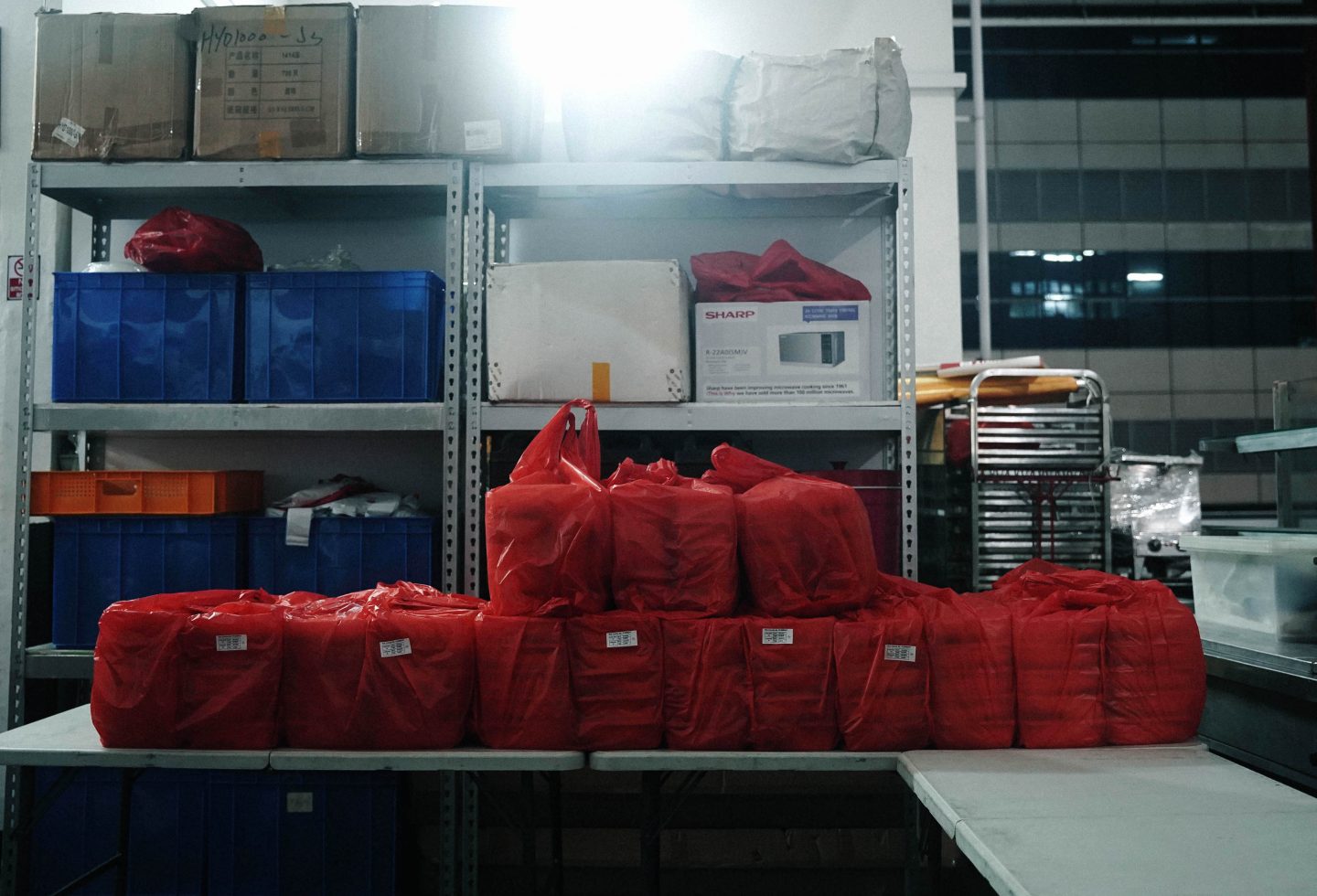
Every night, over 3,000 meals are prepared by two halal night kitchens commissioned by AGWO. Here, 1,344 meals of rice and fish curry by Nawab’s Briyani are waiting to be distributed. It is a stall well-loved by workers for its briyani. Photo by Marcus Chow.
The alliance comprises 130 partners and comes under Hope Initiative Alliance (HIA), a charity whose inter-religious and inter-racial work focuses on helping minority and vulnerable groups.
“Breaking fast is where the communal element comes in, almost like our Passover feast.”
President of HIA, Rev Ezekiel Tan, told Salt&Light that providing pre-dawn meals for those fasting is important as Ramadan is a major part of the Muslim faith.
“Breaking fast is where the communal element comes in, almost like our Passover feast,” said Rev Tan, who is also the general secretary of The Bible Society of Singapore.
AGWO relies on volunteers to do these early morning deliveries, 80% of whom are from churches.
“While it is quite taxing and tiring, we enjoy this community spirit where many are coming alongside us,” Rev Tan added.
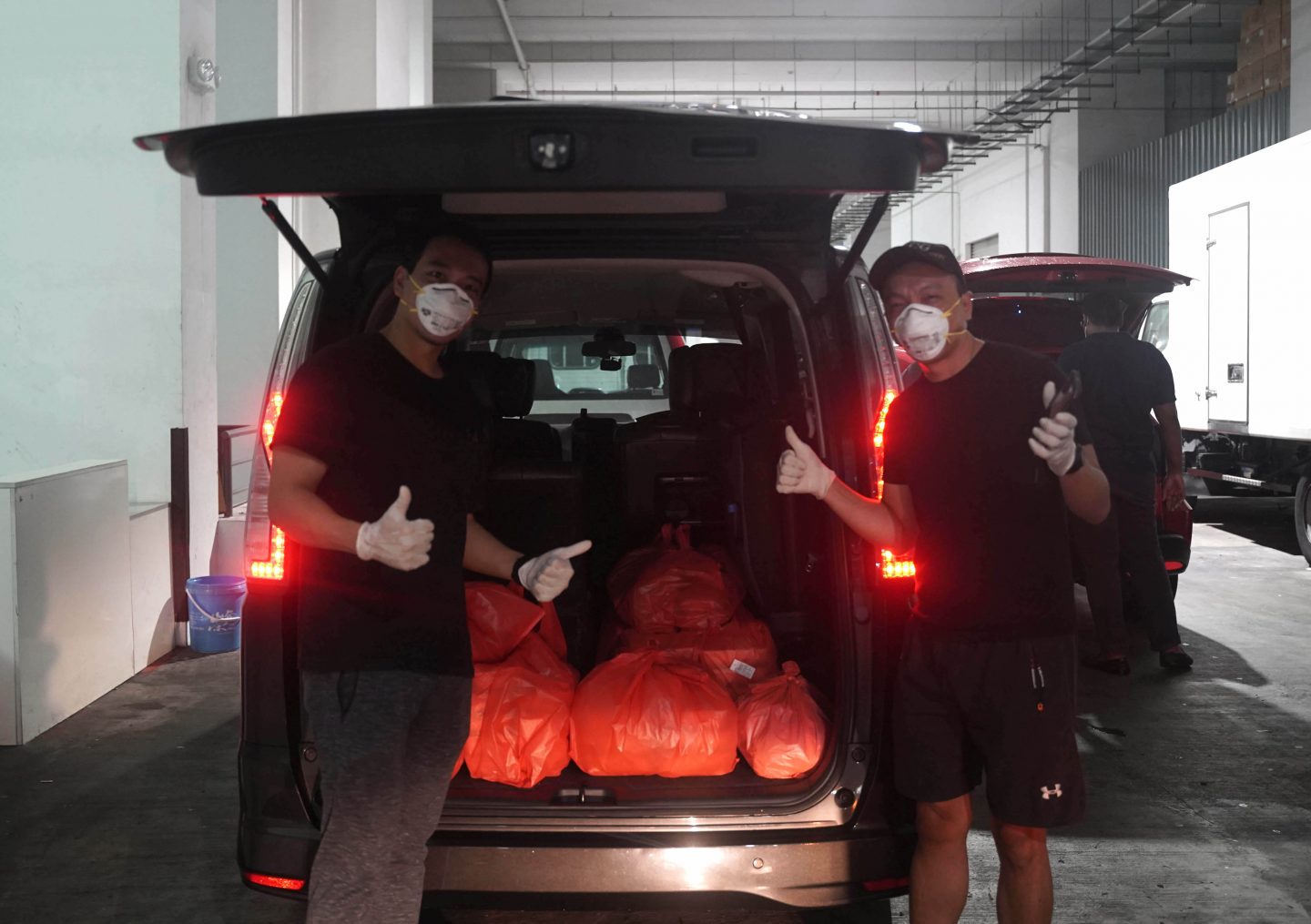
Some volunteers like Johnson Lee (right) and Wu Jun Wei (left) have committed to participate in this effort every night throughout Ramadan. Photo by Marcus Chow.
Apart from providing pre-dawn meals, AGWO has also been feeding migrant workers two meals a day for the past three weeks. Its goal is to feed 10,000 migrant workers in factory-converted dormitories until the Circuit Breaker is over.
According to HIA’s frequently asked questions page, AGWO is focusing its efforts on those in factory-converted dormitories as they do not receive as much assistance as those in the purpose-built ones. There are 80,000 to 100,000 workers staying in the 1,200 factory-converted dormitories in Singapore.
The next meal
This initiative started out as a one-day distribution of food and care packages to about 9,200 workers from more than 100 dormitories on Good Friday (April 10).
“But as we fed them we realised, ‘Gosh. After this meal there is no next meal,'” said Rev Tan, adding that they decided to continue providing for them with whatever they could afford.
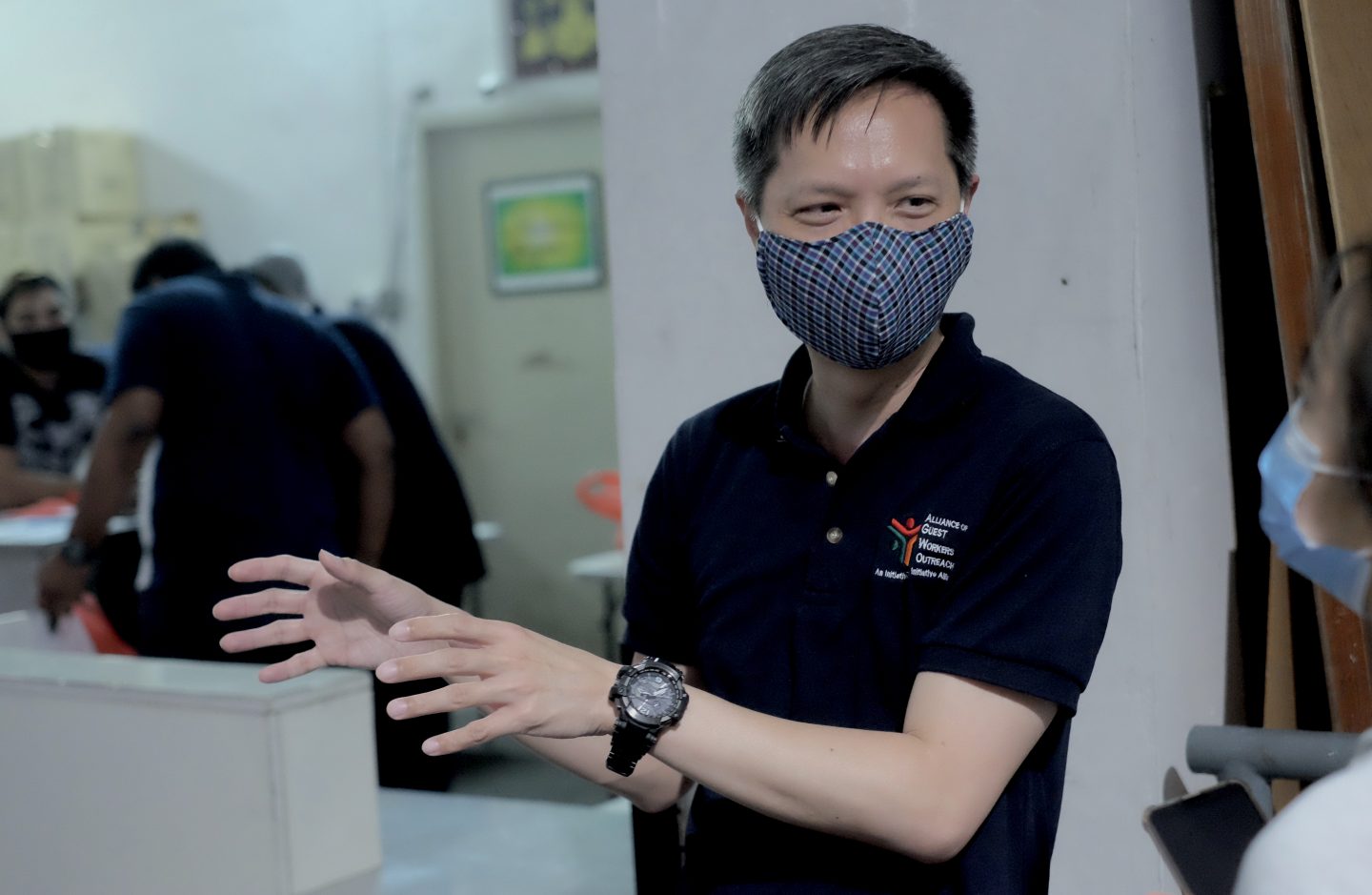
Rev Ezekiel Tan explains the operational and legal aspects of the food distribution effort to Salt&Light, as Pastor Samuel coordinates the logistics with the caterers in the background. Each meal is accounted for as every dormitory is given the exact number of pre-dawn meals, and volunteers are given fixed locations. Photo by Tan Huey Ying.
Since April 21, migrant workers across all dormitories have not been allowed to leave their living quarters as the government tries to control the coronavirus outbreak in migrant worker communities.
“We realised, ‘Gosh. After this meal there is no next meal.'”
While the Ministry of Manpower has mandated that all employers provide catered meals for their workers, many do not do so. There are three main reasons for this, said Rev Tan.
Some are simply negligent and irresponsible, leaving their workers to fend for themselves. Others claim they are not aware or do not know how to go about catering meals for their employees. Still others are struggling with serious cashflow problems because work has halted.
“For us we don’t bother so much about the reasons,” he said. “We just come alongside to help them accordingly,” be it helping desperate employers supply food to their workers or linking them up with existing caterers, he added.
According to statistics on its website, which provides daily updates, they have already given out more than 220,000 meals since Good Friday.
They intend to continue for the next month at least. As each meal costs an average of about $3, they will need $1.8 million to feed 10,000 workers.
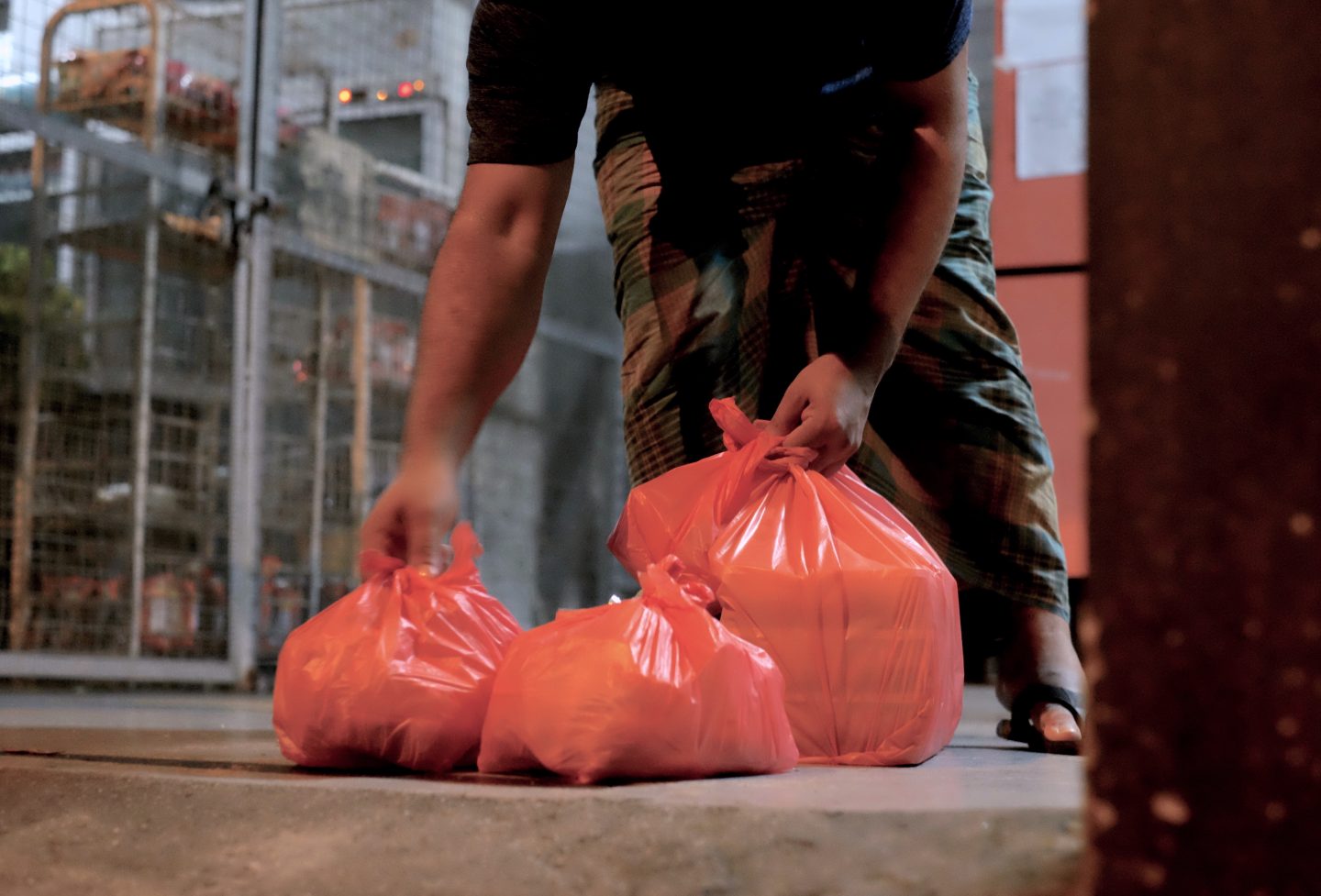
Every person matters. No company is too small to be left out of AGWO’s pre-dawn meal distribution. At this particular location, five meals were dropped off for two workers who were waiting at 3.45am. To respect social distancing rules, volunteers leave the food at the gate before the workers pick them up. Greetings and short conversations take place over a comfortable distance. Photo by Tan Huey Ying.
They have also begun to purchase and distribute medical supples, hygiene products and fruits. Should more resources come in, he said, they hope to provide breakfast too and reach out to even more workers.
“Meet-the-people” sessions
Leading Thursday’s early morning operation was Pastor Samuel Gift Stephen, chairman of AGWO. After arriving at 1.50am, he got to work immediately, hunching over a distribution list on the counter and greeting volunteers cheerfully despite the early hour.
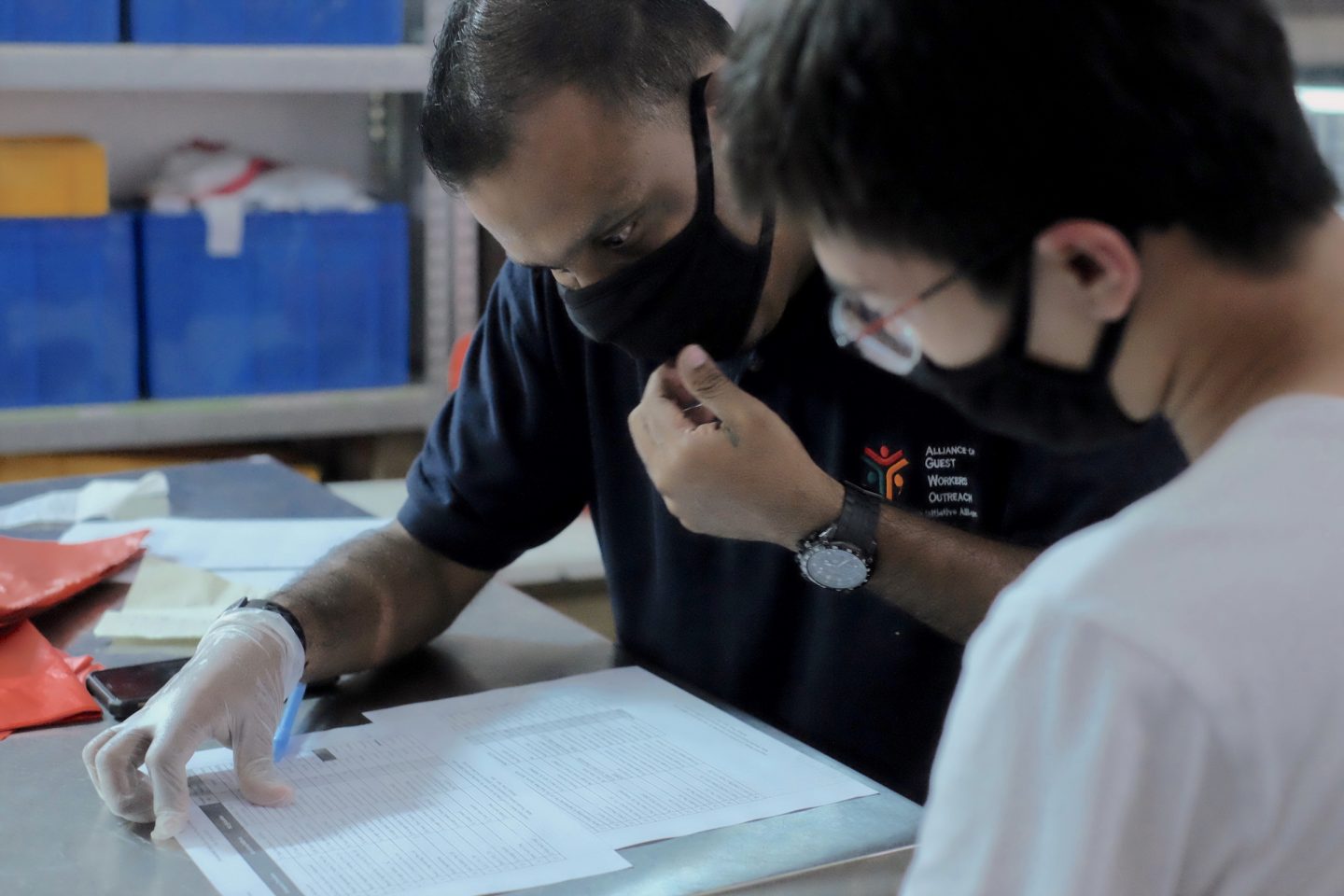
Ps Samuel, despite working 20-hour days, still takes time to chat with and ask after the volunteers he sees. Photo by Tan Huey Ying
“This stall is very famous for its briyani in Little India. The workers love it,” he said of Nawab’s Briyani, which cooked the meals.
“These deliveries are simple acts of kindness, but it assures them that someone is looking out for them.”
For someone who has been working non-stop for the past three weeks, he is unusually energetic. Since Good Friday (April 10), he has been spending more than 12 hours a day caring for the migrant workers cooped up in the dormitories.
He spends at least an hour every morning doing what he calls a “meet-the-people session”, where he walks around Tuas, where there are many factory-converted dormitories, asking the workers how they are, how the food was last night and if they have other needs or concerns.
Pastor Samuel, who is also the senior pastor of Smyrna Assembly in Yishun, does his best to remember their names as he knows it makes them feel important.
The rest of his day is spent ensuring that the migrant workers under his care have enough food, and going out to look for more who may be in need.
Since AGWO began doing pre-dawn meal deliveries, his work days have been stretched up to 20 hours. But he does not mind.
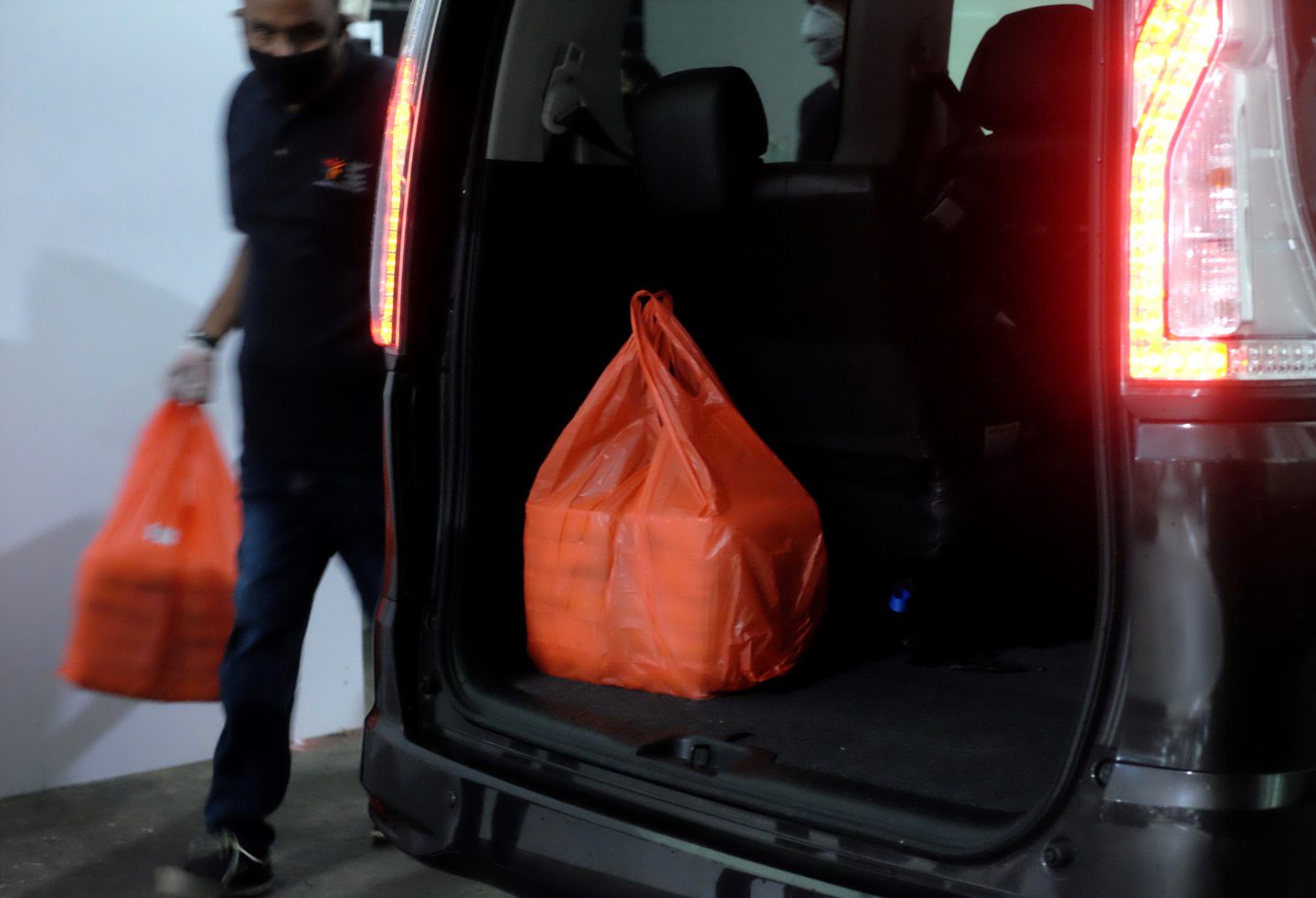
The heart of a servant. After confirming how many packets of food each volunteer is given and counting out the correct number, Pastor Samuel helps volunteers load the meals into their vehicles. Photo by Tan Huey Ying.
“I grew up with migrant workers,” he said, recounting how his late father, himself a migrant from Sri Lanka, spent his whole life reaching out to them.
“At any point in time there were no less than five migrant workers in my home,” he added. “Looking out for them is a part of life that has rubbed off on me.”
First we pray, then we show love
By 2.45am, all of the food deliveries were picked up. The last delivery man to set off is usually Pastor Samuel, who delivers food to four different dormitories and returns home only at dawn.
But Rev Tan decided to take three locations off his hands today so Pastor Samuel could go home earlier to rest.
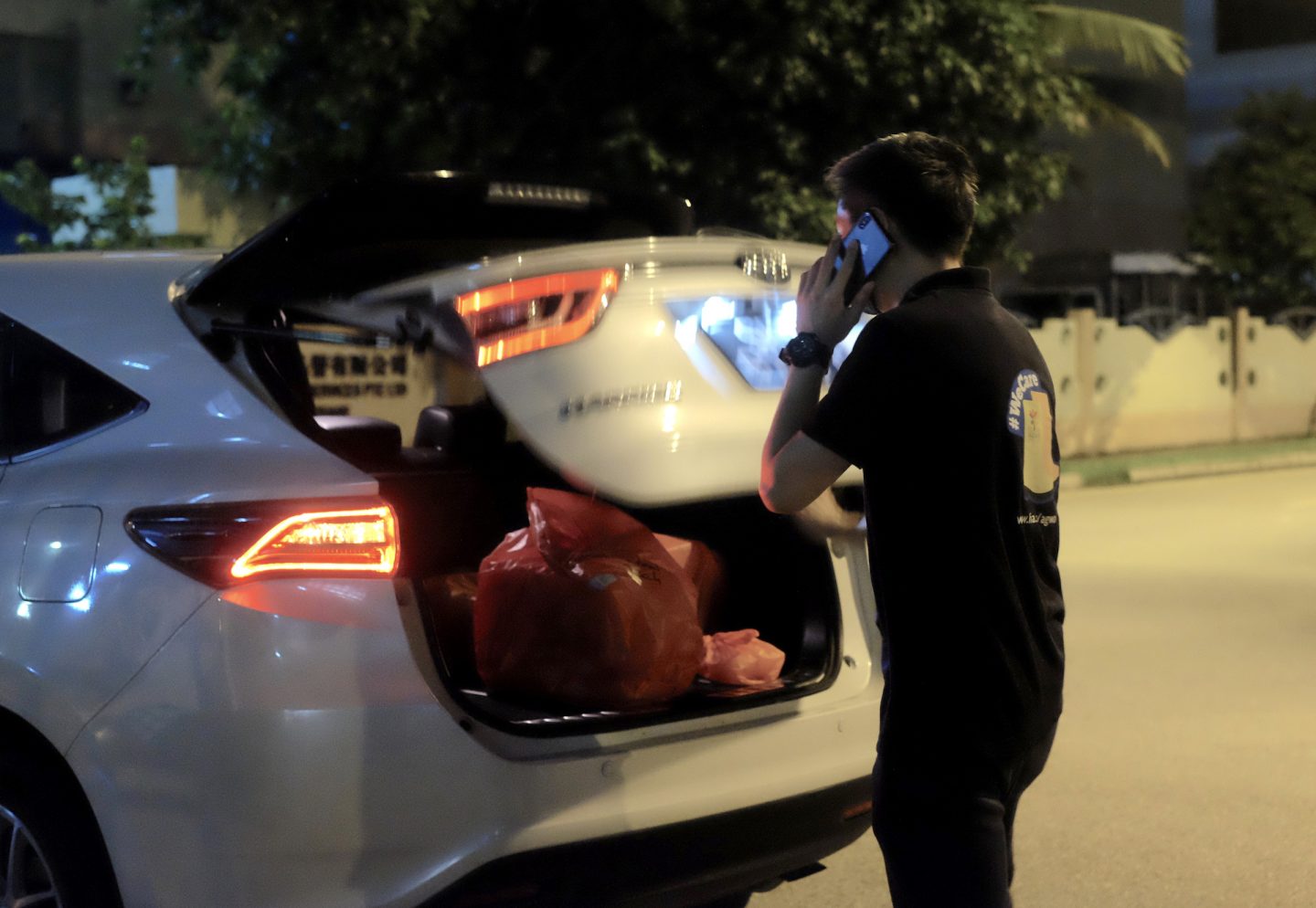
Rev Ezekiel gets ready to head off to the next location in Tuas. Volunteers with HIA are considered essential services by the government as Rev Ezekiel has gotten the relevant permits from all the ministries and stat boards involved. Photo by Tan Huey Ying.
After loading up his car boot with more than 100 packets of food, Rev Tan set off on the 35-minute journey across the island.
“We put aside differences in terms of race and religion, and share care without condition.”
The heart behind this initiative, he told Salt&Light, is simply to show care to a group that is often overlooked in our society. “It’s also biblical for us to show hospitality and care to the foreigners in our midst,” he said.
“We put aside differences in terms of race and religion, and share care without condition.
“It’s only right for us to do something not only by praying for their safety and their health, but also showing our care in a real way.”
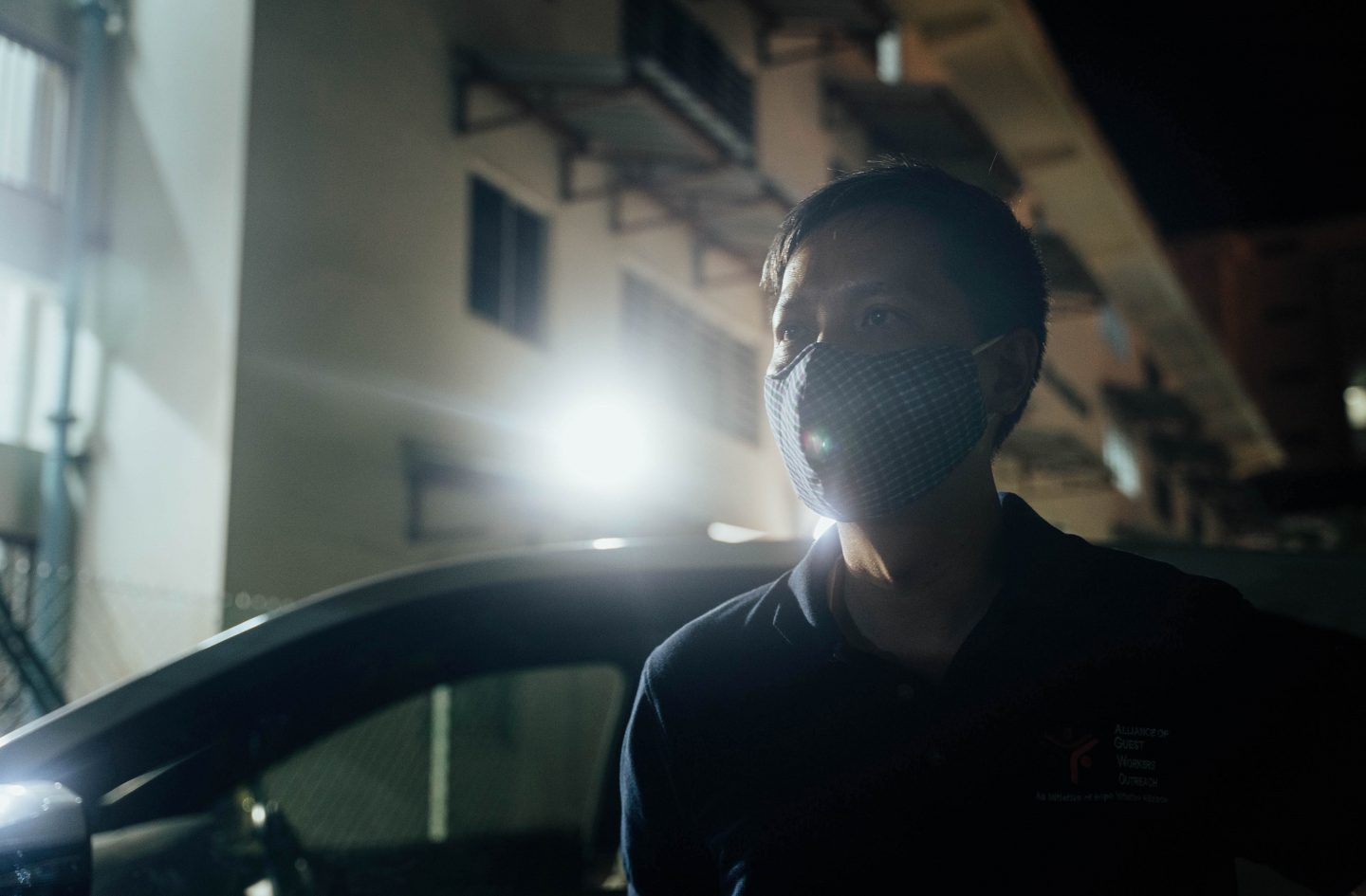
“As it says in James 2:15, we are not just to say ‘Jesus loves you’ or ‘go in peace’. We must first feed and clothe those who are hungry, naked and in need,” says Rev Ezekiel, standing outside his last dormitory for the night at 4.10am. Photo by Marcus Chow.
However, Rev Tan stressed that it is important to volunteer with an organisation that has been registered as an essential service and has been granted permission to do deliveries, instead of doing so as an individual or a self-organised group.
Before, we were scared
Over the next hour Rev Tan dropped food off at three dormitories tucked away in an industrial estate, placing the bags of food just outside the gate, where one or two workers were waiting on the other side.
Keeping a safe distance, he spent a few moments asking how they are doing and telling them to take care.
Islam Rahmatul, 35, was one worker who received the food deliveries on behalf of the 112 other workers in his dormitory. “The food is good,” he said, adding that he appreciates that there is variety every day.
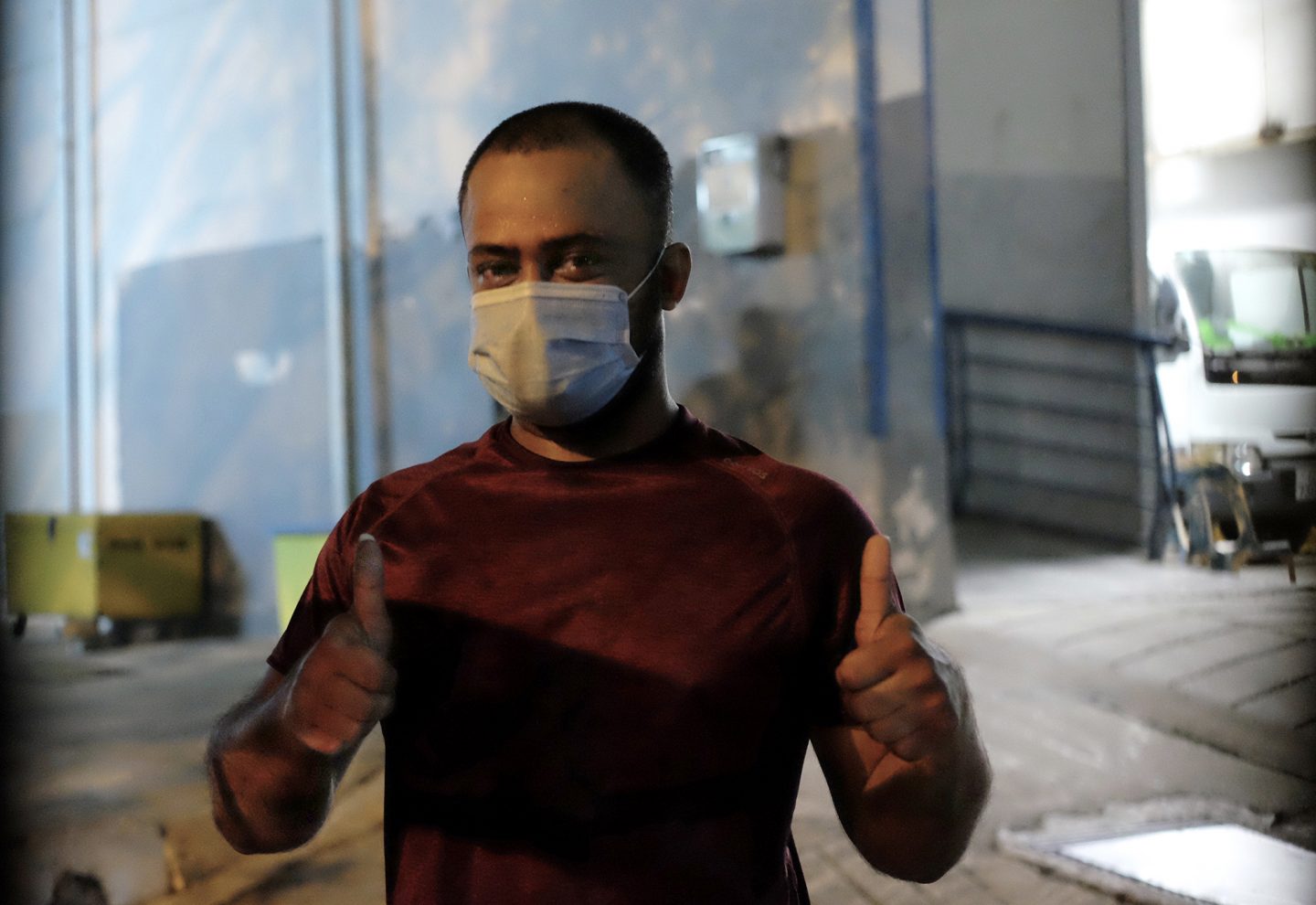
Islam Rahmatul, 35, has been living in this dormitory for the past six years. Photo by Tan Huey Ying
These days he and his friends while away their time sleeping, praying, eating, calling family, playing games, watching movies and exercising, he told Salt&Light.
“Before we were scared. Now we are not scared because the government has taken many steps. Many of you are also helping.”
When asked if they were feeling scared, he said: “Before we were scared. Now we are not scared because the government has taken many steps. Many of you are also helping.”
He has told his wife and three-year-old daughter back home in Bangladesh not to worry about him and to focus on taking care of themselves.
In the 12 years he has worked here, he usually goes home once a year.
But he is not sure when he can next go back to his family. “We hope this problem will go away quickly so we can work again and go home after that,” he said.
Waiting to see family again
By 4am, all the deliveries are complete and the Muslim workers tuck into their pre-dawn meal together.
“They need someone to say, ‘I love you unconditionally. I’m here with you for the long haul’.”
These routine deliveries are simple acts of kindness, but it assures them that someone is looking out for them, said Pastor Samuel.
“What they need is family. Many of them are confused and don’t know what is going to happen. The truth is that they think they’re sitting in the dorms waiting to contract the virus. They think eventually everyone will have it.
“They need someone to say, ‘I love you unconditionally. I’m here with you for the long haul. Whether you get infected or not, I’m here with you.'”
Apart from the provision of their basic needs, what they need the most right now is hope that there will be better days, he added. This is why he encourages them to look past the current predicament to the day the pandemic is over and they can return home to their families.
“But more than that, we give them the hope that God gives us a hope and a future (Jeremiah 29:11). It’s about showing them that there is something better coming along the way.”
The need is great, here is how you can help:
Currently, due to financial constraints, HIA only provides a basic lunch and dinner to about 9,000 workers. There are over 80,000 workers in 1,200 factory-converted dormitories who are receiving less assistance than those in purpose-built dormitories.
HIA hopes to reach more workers and expand the help to include hygiene products, fruits and breakfast, if possible.
Click here to contribute financially.
To offer assistance, supplies or to find out how else you can help, email HIA ([email protected]) or call the hotline at 6304 3486.
We are an independent, non-profit organisation that relies on the generosity of our readers, such as yourself, to continue serving the kingdom. Every dollar donated goes directly back into our editorial coverage.
Would you consider partnering with us in our kingdom work by supporting us financially, either as a one-off donation, or a recurring pledge?
Support Salt&Light

